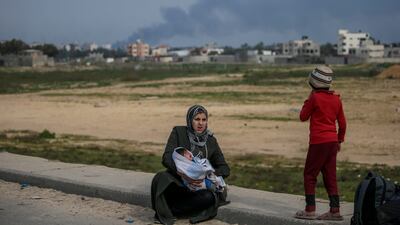Live updates: Follow the latest news on Israel-Gaza
Riham Al Balbasi has two simple wishes for her baby girl – to be safe and to have access to milk.
Ms Al Balbasi, 22, who lives in the Jabalya camp in the northern Gaza Strip has faced immense difficulties in providing for her three-month-old daughter, Soha, during the ongoing conflict.
Many mothers cannot breastfeed their newborn babies because they are not getting enough nutrition for their bodies to produce milk.
"My milk supply is insufficient because I can't nourish myself properly. I'm well aware of the advice given to mothers about the need for a nutritious diet to breastfeed," Ms Al Balbasi said.
"I yearn for my child to receive natural milk, but I feel utterly powerless," she said.
Doctors have told her that her baby is suffering from malnutrition and it repeatedly cries from hunger.
"The cycle is vicious; I cannot eat well, nor can my child," she said.
The babies are part of a generation of Gazans born into homeless, destitute families struggling to survive Israel's ferocious military assault on their crowded strip of land.
The enclave's 2.3 million residents lack access to food, water, adequate shelter and basic supplies to survive the war.
Formula milk, an alternative to breastmilk, is not available in the markets, let alone supplementary baby food and soups, she said.
The World Food Programme (WFP) said no humanitarian group had been able to deliver aid to the north for more than a month, with aid all but blocked from entering by stringent Israeli inspections of every lorry on the Egyptian border, and blocked by extremist Israeli protesters on the Israeli border with Gaza.
“We receive many cases of children with very clear signs of dehydration and malnutrition, and some of them stay for hours before succumbing and becoming martyrs,” Dr Hussam Abu Safia, the director of Kamal Adwan hospital in the Jabalya camp, told The National.
He said that dehydration has affected most citizens in northern Gaza in recent weeks because of malnutrition, and they are suffering from weakness and significant weight loss.
“There are many children who arrive at the hospital showing signs of pallor, yellowing of the skin, general weakness and emaciation due to malnutrition,” he said.
“The lack of available infant formula exacerbates the suffering, especially for new-borns, due to the shortage of milk from mothers who are completely deprived of nutrition,” he said.
Amira Abu Nada, a nurse, reported that cases of fainting and overwhelming weakness are a daily occurrence, largely attributable to poor nutrition and food shortages, compounded by health complications faced by displaced people in shelters.
"We receive children, women, and older adults, some of whom have endured days without food," she said.
"Tragically, our capacity to take care of them is severely hindered by a lack of supplies, particularly nutritional supplements and vitamins that could mitigate their hunger," Ms Abu Nada told The National.
Jumana Ali, 22, who is from Gaza City and in her fifth month of pregnancy, is resliving with a 22-member family. She described her worries.
She learnt of her pregnancy just one week before the war. "This pregnancy is my first and has unfolded amid the turmoil of war," Ms Ali told The National.
The development comes as a senior UN official said on Tuesday that at least 576,000 people in the Gaza Strip – one quarter of the population – are one step away from famine.
Speaking to the Security Council, Ramesh Rajasingham from the UN's Office for the Co-ordination of Humanitarian Affairs, said “if nothing is done, we fear widespread famine in Gaza is almost inevitable.”
The UN children's agency, Unicef, has said that the alarming lack of food, surging malnutrition and disease could lead to an "explosion" in child deaths in Gaza.
On February 19 it estimated that one in six children aged under two in Gaza were acutely malnourished.
Residents have taken to eating scavenged scraps of rotten corn, animal fodder unfit for human consumption and even leaves to try to stave off the growing hunger pangs.

